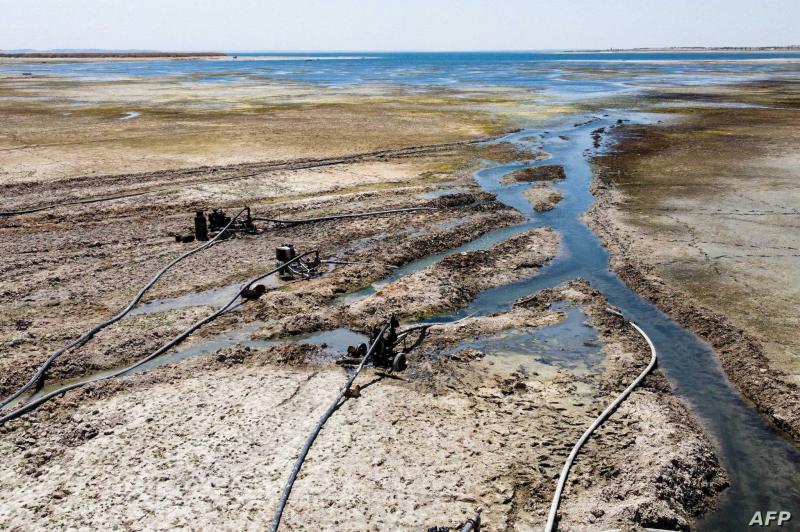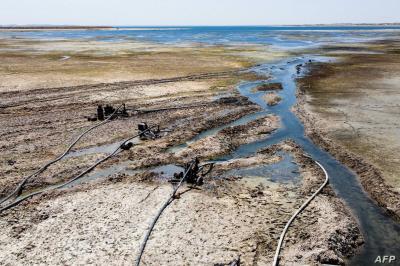Under the title "Drought is Coming for Sure: Political Conflicts and Declining Euphrates River Levels Threaten Syria," the Al-Hurra website published a news piece quoting the French press agency, highlighting that the Euphrates River has long nourished the olive grove owned by Khaled Al-Khamis in northern Syria. However, since the beginning of the year, the river's flow has decreased, and its waters have dried over extensive areas. Trees have withered, making it difficult for him to even secure drinking water for his family. In the village of Al-Rmailah in Aleppo province in the north, Khaled (50 years old) told AFP, "It's as if we are living in a desert... We even want to displace and are considering immigration due to the lack of drinking water to irrigate the trees."
For months, experts, technicians, and humanitarian organizations have been warning of a disaster in northern and northeastern Syria, where the Euphrates River flows, which might threaten the functionality of its dams. The drop in water levels since January could lead to water and electricity shortages for millions of residents, thus exacerbating the suffering of a population exhausted by a decade-long conflict and severe economic collapse. Instead of caring for olive fields, Khaled and the villagers now plant corn and beans on land that has dried due to the river's water loss. Khaled, who has 12 children, said, "Women walk seven kilometers to fill bottles of drinking water for the children."
In drought-threatened areas under the control of the Kurdish self-administration, many accuse Turkey of withholding water and using it as a weapon against Kurdish fighters, whom it considers "terrorists," a claim denied by a Turkish diplomatic source. Turkey attributes the drought to climate change, which the United Nations warned in a recent report could lead to "unprecedented" disasters in a world experiencing consecutive heatwaves and floods.
In 1987, Syria signed a water-sharing agreement with Turkey, under which Ankara committed to providing Syria an annual average of 500 cubic meters per second, but this amount has dropped to more than half in recent months, reaching 200 cubic meters per second at times, according to technicians.
The Euphrates River, the longest river in Western Asia, originates from the Taurus Mountains in Turkey and flows into Syria, from the city of Jarabulus in the northern Aleppo countryside through Raqqa province to Deir ez-Zor in the east, reaching Iraq. The river covers 2800 kilometers from Turkey to Syria to Iraq. In Iraq, it meets the Tigris River to form the Shatt al-Arab before flowing into the Gulf. In Syria, two main dams have been built on the Euphrates: the Tishrin Dam in northern Aleppo countryside and the Tabqa Dam, where the massive Assad Lake is located in eastern Raqqa province. The two dams cover 90% of northeastern Syria's electricity needs, including the power required for water pumping stations, and the decline in water levels threatens their operation.
The director of Tishrin Dam for the past 13 years, Hamoud Al-Hamadi, warns of a "historic and terrifying" drop in water levels not seen since the dam was built in 1999. Since December, the water level in the dam has decreased by five meters, and if this trend continues, it will reach what Al-Hamadi refers to as the "dead level," meaning that the turbines would completely stop working. In addition to the reduction in electricity supply to the region, several water pumping stations have ceased operation, according to Al-Hamadi, who warned that declining water levels threaten to increase pollution rates and endanger fish resources. He says, "We are heading into a humanitarian and environmental disaster."
At the Tabqa Dam, the water level in Assad Lake has also dropped by about five meters and is approaching the dead level. Overall, northeast Syria has seen a 70% reduction in electricity production because the Tishrin and Tabqa Dams are not functioning properly, according to Walat Darwish, a power authority official in northeastern Syria, speaking to AFP.
In Syria, the Euphrates flows mostly through areas controlled by the Kurdish self-administration and its military wing, the Syrian Democratic Forces, which are supported by Washington but are considered a primary opponent by Turkey, which classifies the People's Protection Units, a crucial component of the SDF, as a "terrorist" group. Since 2016, Turkey and allied Syrian factions have launched three military operations in Syria targeting Kurdish fighters.
The self-administration accuses Ankara of obstructing the flow of the Euphrates River into Syria and of using water as a weapon to exert pressure. Damascus has also accused Turkey, which has supported factions in the Syrian opposition since the onset of the conflict, of withholding Euphrates River water and not adhering to the agreement signed in 1987. However, a Turkish diplomatic source told AFP that the country "has never reduced the water flow rates for political reasons or any other reasons." It explained, "Our region is facing the worst periods of drought due to climate change," pointing to the "lowest level of rainfall recorded in at least 30 years" this year in southern Turkey.
Researcher Nicholas Heras doubts Turkey's intention to use the Euphrates as a weapon for its benefit, as it would complicate its relations with the United States, which supports the Kurds and is its broader ally, and with Russia, a primary supporter of Damascus but also its partner in several ceasefire agreements in Syria. Heras states that "the easier water weapon, which Turkey has used repeatedly, is the Alouk station" located in an area under its control since 2019. The UN reported that the Alouk water station had experienced water cuts 24 times since 2019, affecting the lives of 460,000 people who rely on it in Al-Hasakah province.
Even if the disaster threatening northern and northeastern Syria is due to a decline in rainfall levels, experts believe that Turkey could exploit the situation for its geopolitical interests, according to Syrian affairs expert Fabrice Balanch. He states, "During drought periods, Turkey uses the water it needs and leaves the leftovers for the Kurds, even while fully aware of the consequences." He adds that the aim is to "suffocate northeastern Syria economically."
Environmental expert Marwa Dawoodi explains that the drop in the Euphrates River levels threatens "the rural communities along its banks that depend primarily on agriculture and irrigation." According to humanitarian organizations, the drought has eliminated vast agricultural areas that mainly depend on rainfall in a country where 60% of the population suffers from food insecurity.
The UN reported that barley production could drop by 1.2 million tons this year, complicating feed availability for livestock in the coming months. Balanch predicts that Syria may be facing drought that could last for years and has not seen since the last drought episode between 2005 and 2010. He warns, "Farmers will have to reduce planted areas in the coming years," warning that all of Syria "will witness food shortages and will need to import large quantities of grain."
In Iraq, the Norwegian Refugee Council also warned that the drop in Euphrates River flow could deprive seven million people of water. Council spokesperson Karl Schimberi noted, "The climate does not consider borders."




